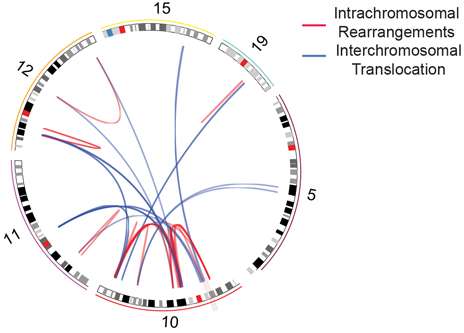Deadly and distinctive—cancer caused by gene deletions

A deadly form of T cell lymphoma is caused by an unusually large number gene deletions, making it distinct among cancers, a new Yale School of Medicine study shows.
Researchers conducted a genomic analysis of normal and cancer cells from patients with cutaneous T-cell lymphoma, a cancer of T-cells of the immune system that normally reside in the skin.
Most cancers are driven by point mutations—or single DNA nucleotides that change the function of an encoded protein—rather than deletions that remove a segment of a chromosome. However, in this form of lymphoma, gene deletions that drive cancer pathogenesis outnumbered point mutations by more than 10 to 1, scientists report on July 20 in the journal Nature Genetics.
"This cancer has a very distinctive biology," said Jaehyuk Choi, assistant professor of dermatology at Yale and lead author of the paper.
Many of the deletions occurred in genes that have been known to play a role in driving the proliferation of T-cells and are potential targets for new therapies, said Choi, a researcher with the Yale Cancer Center.
It is unclear why this cancer has such a high ratio of gene deletions compared to other cancers, said Richard Lifton, Sterling Professor of Genetics, chair of the Department of Genetics, investigator for the Howard Hughes Medical Institute, and senior author of the paper. He noted, however, that during early development DNA rearrangements can produce highly diverse T cell receptors, which enables them to recognize cells bearing viruses or other abnormal proteins. These lymphomas may arise from loss of the normal regulation of these genetic rearrangements, he explained.
More information: "Genomic landscape of cutaneous T cell lymphoma." Nature Genetics (2015) DOI: 10.1038/ng.3356

















